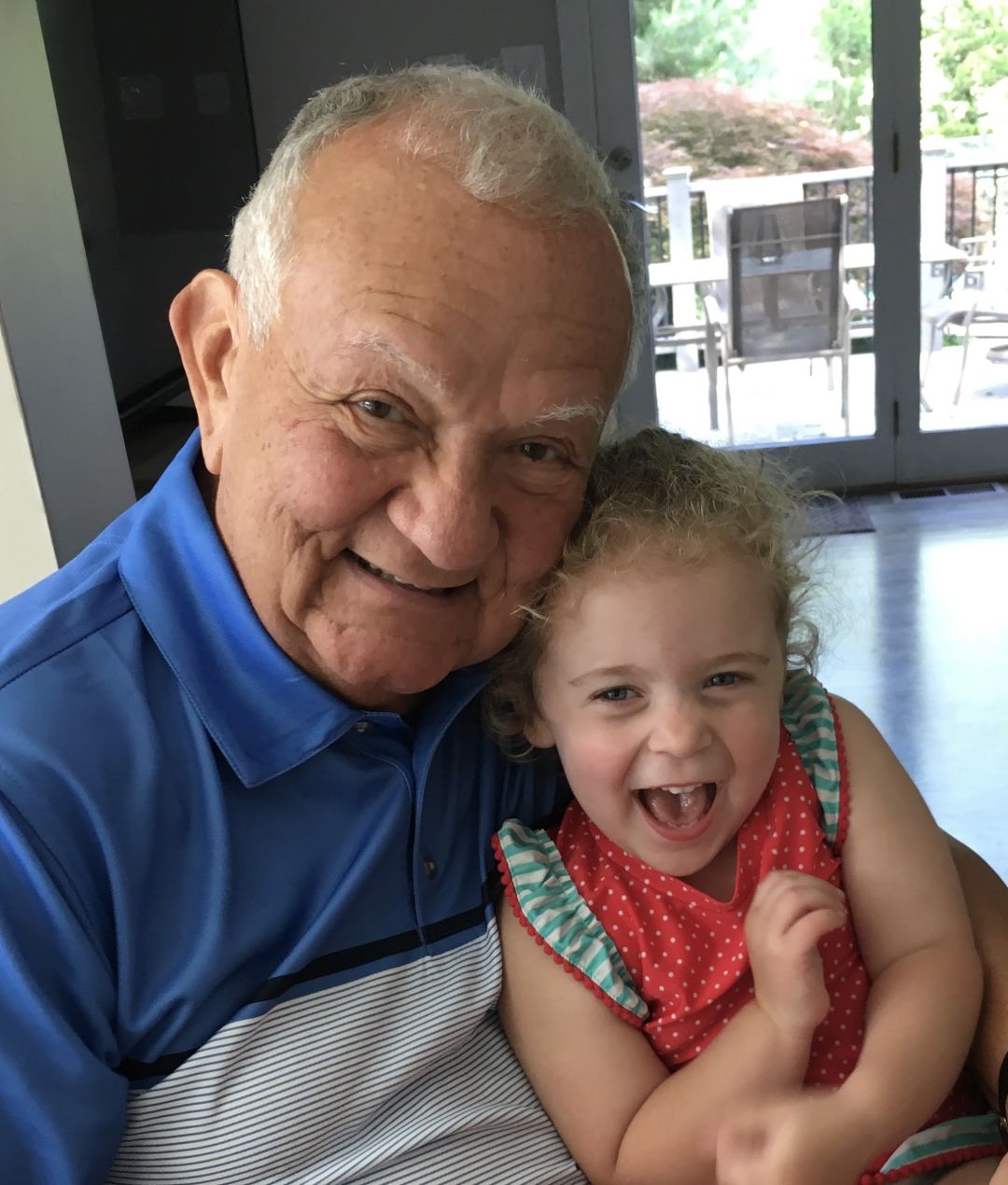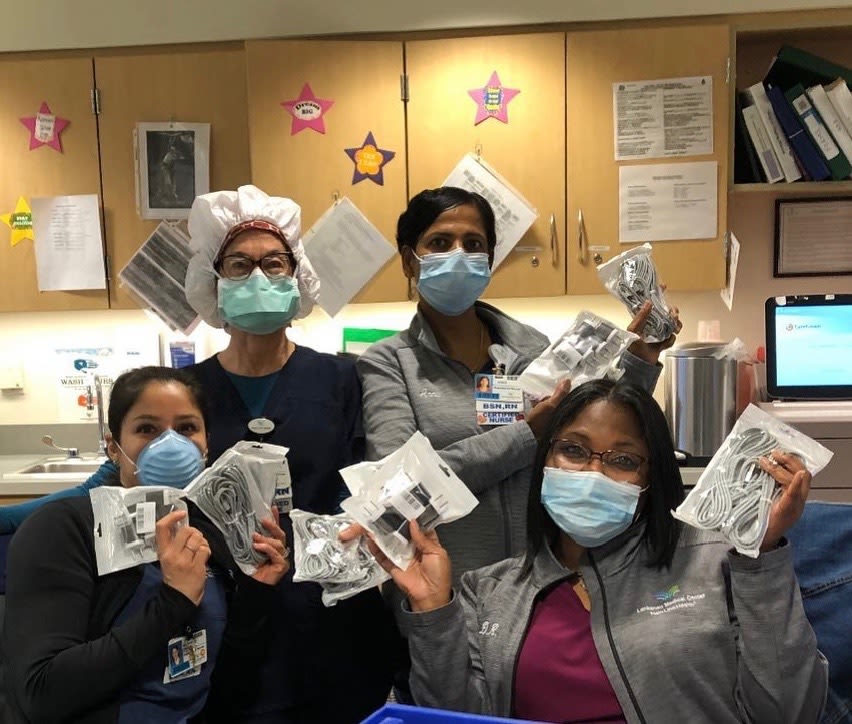'They Almost Lost Me Three Times': A COVID-19 Patient Shares His Story

Steve Hefler and his granddaughter.
Image: Courtesy Photo
Navy veteran and pediatrician Dr. Steve Hefler spent 49 days at Sarasota Memorial Hospital after contracting COVID-19 on a trip to San Diego, California. After a gruesome battle that included weeks on a ventilator and total isolation from family and friends, the 77-year-old was released from the hospital on May 15 with a triumphant send-off celebration from hospital nurses and staff. Here is Hefler's story.
"I was out in San Diego on the weekend of March 13 and started to notice an odd cough developing. When I arrived home to Florida on March 16, I experienced extreme exhaustion for the following 22 hours. For two weeks up until my admission, I was mostly sleeping, drinking water and had no appetite. I decided to go to an outpatient facility to get tested. The first facility said I didn't qualify for COVID testing with my symptoms, so I went to a second facility where I received testing. My test came back positive on March 24, but for those two weeks, I was putting things off. My wife finally said, 'We are going to the emergency room,' on March 28. I was admitted right away."
"Once I was hospitalized, my symptoms worsened. I was unconscious my first week in the intensive care unit, and the only recollection I have is from my wife, who kept diary entries for me during that time. Once I gained consciousness, the nurses filled me in. I was exhausted, I had a persistent fever and my cough worsened. I was on a ventilator for 23 days. My kidneys failed at one point due to dehydration, so I was on dialysis for a number of weeks. I was also on antibiotics and given a nasogastric feeding tube. A chest x-ray of my lungs showed lots of fluid, so doctors treated me for that, too."
"They almost lost me three times on my first day in ICU. Twice in the first week, my wife was called to say her last goodbyes. The doctors said that if I choked, they couldn't save me. But that's when my son, who I am so proud of, sprung into action and asked that I be resuscitated twice more, which thankfully they did. My wife did a lot of crying during this period. I really can't imagine what it would be like if the roles were reversed."
"When I eventually became lucid, I remember having weird hallucinatory dreams about aliens and all sorts of things. But, I had to have faith I was going to get better. I put full trust in the doctors and nurses, and surrendered to their care. There were no visitors allowed in the hospital, even in the rehab. So I was video-chatting with my wife, son and brothers sometimes twice a day. It was tough not seeing them."
When Helfer was admitted, he had little power left on his cell phone and had forgotten to bring a phone charger. That's when a kind nurse lent a phone charger, which allowed Hefler to keep in touch with his family. This situation sparked an idea in Hefler's son, Jonathan Hefler, who has started a foundation donating phone chargers to hospitals.
"Having that phone charger was instrumental. I was told that every time I heard my wife's voice over video chat, despite being unconscious, my blood pressure would rise and I'd start to come to. Everyone that is sick or dying alone in the hospital deserves this kind of support from their families."

Staff at Lankenau Medical Center in Wynnewood, Pennsylvania, hold phone chargers donated through Charge, the nonprofit started by Hefler's son.
Image: Courtesy Photo
Jonathan has raised more than $40,000 and has donated more than 5,000 phone chargers to intensive care units across the country.
"Despite the intensity of my case, Sarasota Memorial staff were just marvelous. From the nurses, to the doctors and rehab unit, everyone was on their game. As a physician, I can evaluate the quality of care I received, and it was stellar in every respect. The physical and occupational therapists helped me regain strength, as I'd lost 40 pounds, and they're just so knowledgeable. Even the food was good, and you can't say that of every hospital. It's just an incredible institution. I am forever grateful to Sarasota Memorial."
Hospital nurses and staff took care a step further when they organized a send-off celebration for Hefler when he was discharged.
"I couldn't believe my eyes when I walked out of the elevator on discharge day. There were about 50 people, my therapists, doctors and nurses, all cheering me on. As my wife and I drove out of the parking lot, staff played the song 'Take Me Home, Country Roads' by John Denver and were singing along. Apparently, my nurse, Del, had asked my wife days prior what my favorite song was. Now, staff have started asking patients what their favorite songs are, and will continue this tradition."
"The nurses at the COVID ICU unit are heroes. They went above and beyond, and never gave up on me."
Hefler has since returned home and continues to receive care from home rehab specialists, therapists and nurses who visit twice a week.
"I'm taking things day by day. I still have little appetite and a lingering cough, but I am getting stronger. I just pray for our country and that, going forward, people really care for each other and their neighbors. This experience has put into perspective what's most important: family and friendships."
"And I'm really happy to be home."
To learn more about Johnathan Hefler's nonprofit, CHARGE, click here.



